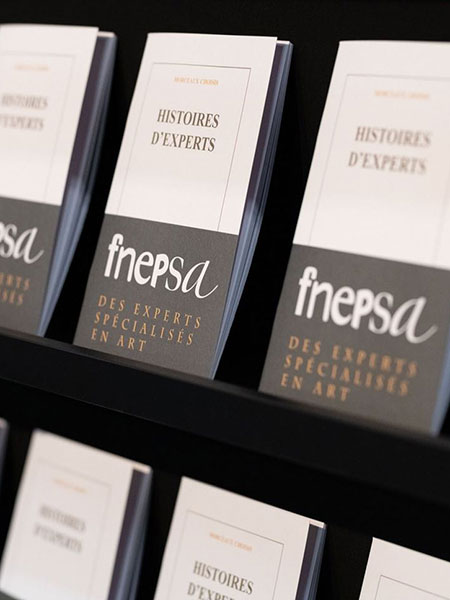
* Required fields
Contact & informations
14, avenue de l'Opéra
75001 Paris
France
75001 Paris
France
By continuing to use this website, you accept the installation of cookies to collect data for technical and statistical purposes.
See moreThere is neither in France nor in Europe a regulation framing and protecting the title of independent professional expert specialized in works of art and collectibles.
For this reason, the national federation of the professional experts specialized in art, association Law 1901 gathering independent professional experts, established a code of deontology, detailing the rules and the duties that its members commit themselves to respect under penalty of exclusion after meeting of the disciplinary commission.
The aspiring expert who applies to Fnepsa undertakes to respect the values of probity, rigor, ethics and independence developed below.
He must have a clean criminal record and a minimum of 5 years of professional experience in his field of specialization.
His/her knowledge and experience in his/her field of specialization must be recognized by the Board of Directors, which will do everything in its power to verify them.
Once accepted, the trainee-member begins a probationary period of up to two years. During this period, he will submit a thesis which will include a chapter describing the means of detecting forgeries, copies, plagiarism, etc... in relation to his specialty.
During this probationary period, he is not allowed to use the title of "Fnepsa approved expert" and cannot use the name of Fnepsa in his professional activity.
An expert from another company of experts or an academic competent in his or her field of expertise will be exempted from writing the memorandum and will be approved by co-option of the Board of Directors.
A professional liability insurance will be required from the applicant when he/she becomes an approved expert.
The art expert must demonstrate serious competence in his field(s) of specialization (within the limit of three) and act according to principles of probity and morality uniting competence and experience.
An expert is chosen for his skills, his technical knowledge in a specific field. He gives an opinion on examinations, findings, precise and objective facts.
He cannot commit himself on the basis of visual examinations of the work or the collection which will be the subject of the estimate.
He will establish an estimate of the amount of his fees. This estimate must be signed by the client.
The certificate of authenticity takes the form of a written document containing information allowing the identification of the work, namely, and as far as possible, its photograph, the name of the author if known, a description of the object, the supports and materials, its dimensions, a dating or a period of creation if known, the state of conservation with mention of possible restorations if they could be visually identified.
If the client asks the expert to carry out additional research on the work, such as a verification of the provenance, the establishment of a history, scientific analyses, stylistic or iconographic analysis, they will be quantified, submitted to the client and will be the subject of an amendment to the previous contract.
Because the information mentioned on the certificate of authenticity is provided according to the principle of an obligation of means, the expert will have to adopt a serious and rigorous working method.
In addition, the expert has an obligation of information which includes the duty to inform, the duty to warn and the duty to advise. He informs himself on what the client really wants, on his situation or on the expectations which will have been clearly communicated by the latter. The client undertakes to provide the expert with all the information necessary to carry out his mission. The expert cannot be held responsible for a failure to fulfil these obligations if a decisive piece of information has not been communicated to him, whether knowingly or not.
The expert member of Fnepsa will scrupulously take care not to find himself in a situation of conflict of interest with his client. A conflict of interest obliges the expert to refuse his mission.
He is bound by a duty of confidentiality.
The competence of the expert will only be complete if he remains independent and impartial.
He must not have any legal or emotional ties with anyone who could influence his mission.
Fnepsa does not act as an intermediary between the expert member and his client. It does not give any advice in the recommendation of its members. It does not profit from the payment of the fees of its expert members.
The liability of Fnepsa's certified Art expert members is governed by the French Civil Code and Commercial Code.

* Required fields
